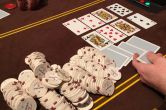Seven Reasons Not to Be the Table's Poker Know-It-All

I love people-watching. Other human beings are endlessly fascinating. Even when I'm at a museum or a zoo, a place I have specifically visited to see the unique non-human things on offer, I often spend a large fraction of my time watching other people looking at the displays.
One of the consistent interactions between people that you see in such places is this: One half of a couple is looking at the exhibit, while the other is reading the informative sign. The one reading the sign will learn some interesting little fact �� and the first response is to want to share it.
"Hey, honey, this says that snow leopards have so much white on them because the cold weather freezes the DNA that's responsible for making pigment!" (Note: This is not an actual fact. I made it up.)
I think we all have an impulse to teach others what we know. It's deeply embedded in the coding of what makes us such intensely social animals. The urge to teach what we know is what has allowed us to flourish as a species. We don't have to discover from scratch how to make fire, grow wheat, or drive a car. One of our fellow homo sapiens will teach us, just as he or she was taught before.
This impulse manifests itself at the poker table, just as it does everywhere else. I'll sketch a scene, and you can think about how you'd react to it.
Player A raises. Player B looks at his cards and calls. The flop comes. Player A bets. Player B looks at his cards again, sighs, and folds. He then says, in obvious frustration, "When you have a pocket pair, you're supposed to flop a set once every three times on average, but I've been playing ten hours today and haven't hit yet."
Now, if you're savvy enough to be reading PokerNews for strategy tips, you probably already know that the actual probability of flopping a set is only about 12%, or closer to one in eight times than the one in three times that poor Player B is thinking the poker gods owe him. Would you tell him?
It's sure tempting, isn't it? Some of that is probably ego �� you get a little jolt of self-satisfaction from knowing the right answer when someone else doesn't. But part of it, too, is that simple, universal, laudable desire to share our hard-won knowledge.
So, do you do it?
I hope not.
As a general rule, the poker table is a terrible place to teach somebody else about poker. That's particularly true if that somebody else is a stranger to you, as will usually be the case. Let's count the reasons it's usually a bad idea to give unsolicited poker advice or information:
- Nobody likes to be told he or she is wrong.
- You might start a pointless argument that sours everybody's mood.
- If you teach people to play better, they're likely to, ya know, play better, which costs you money.
- You might come across as a know-it-all, which is not a popular character in most social groups.
- You potentially mark yourself as knowing more about poker than others. There may be novices at the table who had no idea that it was even possible to calculate such a probability, let alone walk around with the number memorized. As a result, they may leave the game, feeling intimidated, or avoid playing hands with you specifically, because they now realize that they're at a disadvantage.
- If Player B believes you, he will realize that he's not as terribly unlucky as he had been thinking. Usually, people play worse when they're feeling unlucky, so you might improve his attitude and performance.
- Your comment gives other players more information about where you stand in the spectrum of poker knowledge and experience. That is something that is better that you force them to figure out on their own, because it's information that makes it easier to guess how you play, and therefore beat you.
In spite of that long list of possible bad consequences, there are plenty of things that are perfectly fine to teach other players about. This is particularly true when you recognize that somebody is playing for the first time. There's a long list of items that, if you see they're unsure about, are not on the forbidden list.
As just a few examples that new players often don't understand, it's fine to explain how the blinds and straddles work, how to get a seat change, how to get comps from the poker room, where the restrooms are, and the mechanics of getting change if you don't have the exact chips for a bet or call.
Put more generally, all of the ancillary things are fair game. In fact, in most cases the recipient of your shared knowledge will be grateful, and you'll rightly feel good about making a newcomer's experience better. These things reveal nothing about you except that you've played once or twice before, and they teach him nothing that makes it harder to win his money.
But strategy tips, poker facts, how to play in some given situation, and the like �� these are all off-limits. This is not because the rules forbid such discussions, but just because it's a bad idea, for all the reasons mentioned previously.
If you become a poker coach some day, great �� people can pay you to reveal all you know. But even then, you do it away from the table, not while a game is in progress.
Should some situation arise like the one I described, resist the urge to issue the correction. Sit back and see if anybody else yields to the temptation to be the teacher. If they do, that will tell you something important about them �� namely, that they haven't yet progressed in their poker wisdom far enough to know when to keep quiet.
Robert Woolley lives in Asheville, NC. He spent several years in Las Vegas and chronicled his life in poker on the ��Poker Grump�� blog.
Want to stay atop all the latest in the poker world? If so, make sure to get PokerNews updates on your social media outlets. Follow us on Twitter and find us on both Facebook and Google+!









